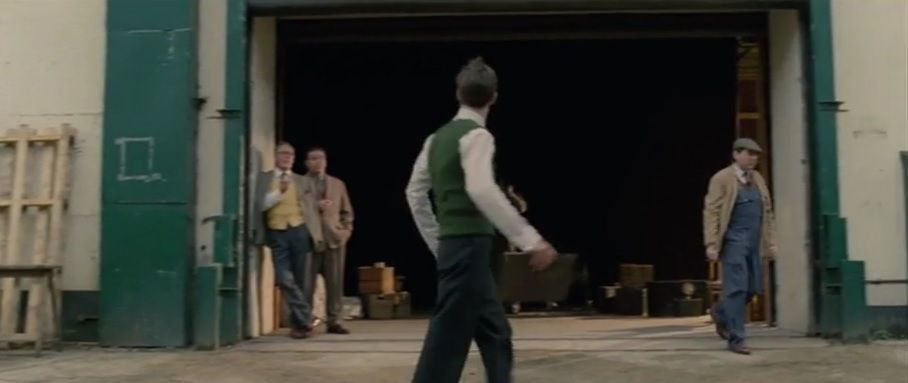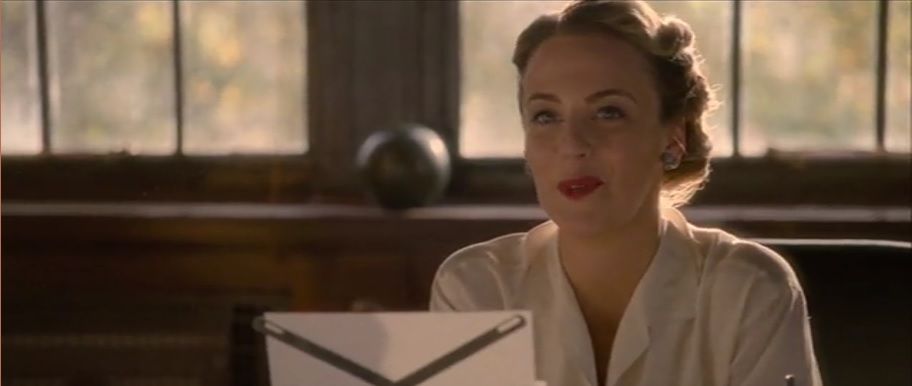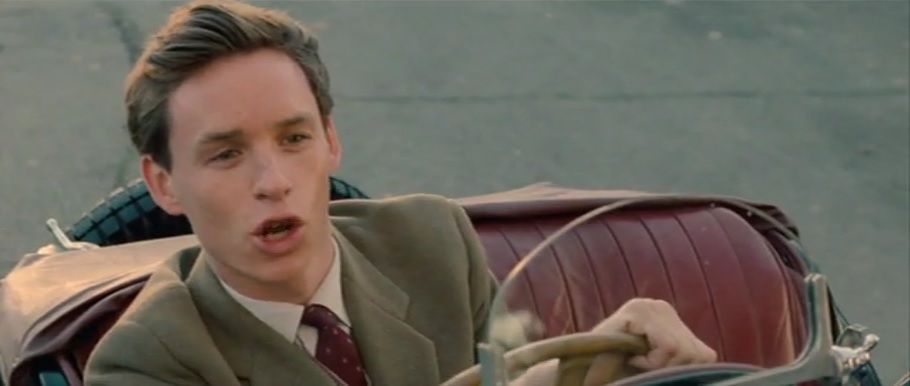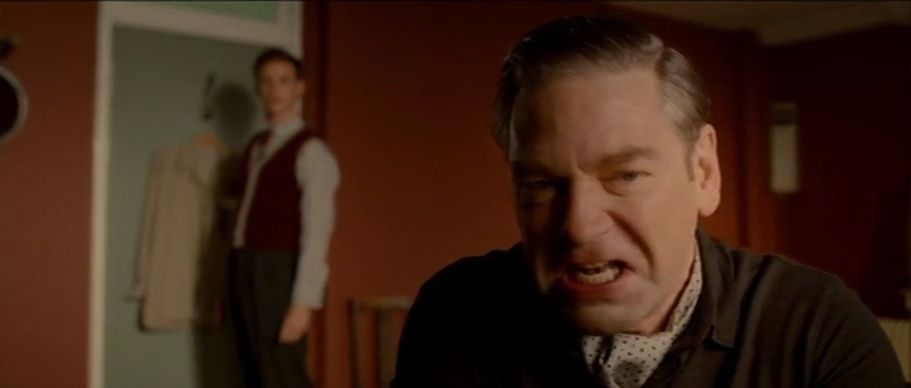My Week With Marilyn: The Myth of the Irresistible Woman and the Destruction of the Belief in Men’s Innocence. Part 2
3. Both Colin and Laurence are in a serious situation, neither of them is going to find any support and both of them are going to see their life ruined by their encounter with Monroe.
Laurence Olivier was trying to operate a shift from theater to cinema. After the movie, he completely abandons any desire to make movies and accept a role in a play that which is exactly what he was fleeing from.
1h26m
(Large shot) Laurence - Do you know, I think directing a movie has to be just about the best job ever invented.
(Super close shot) Laurence - But Marilyn's cured me of ever wanting to do it again.
Isn’t this an extremely violent statement ? “I’ve just given up on practicing the most wonderful job that ever was invented because of what I’ve been through with Marilyn Monroe.”
Laurence - Well, now I'm back to the theatre. John Osborne's writing a piece for me.
Colin - Sir, I thought you hated all that Royal Court stuff.
Laurence - Well, Miller made me see things a little differently.
Miller is Marilyn’s husband, what he has to say about her is : “She’s devouring me.” This, three weeks after they got married.
Colin Clark explains from the very start that his goal is to make a career in cinema.
02m58s
Colin - Alfred Hitchcock. Orson Welles. Laurence Olivier. These were my heroes. I wanted to be a part of their world. When I was 23, I got my chance.
Alfred Hitchcock, Orson Welles, Laurence Olivier all are film directors and we’re given to see Colin watch Laurence and Vivien on a cinema screen with awe.
The movie starts on Marilyn Monroe’s show that Colin is watching too, but not with the same kind of awe. He finds her attractive and arousing sure, but he wants to get into cinema because of the men he admires not because of that woman.
The separation is made from the very beginning. Marilyn sure can arouse Colin, that doesn’t mean that he confuses his attraction to her with a desire to work in cinema. He wants to work in cinema and he wants to be a success in order to earn his family’s respect of “overachievers”, that’s his priority.
But Marilyn, through violent seduction that would immediately be identified as sexual harassment if she were a man and Colin a girl, Marilyn is going to have him “whip himself”: act contrary to his best interests. She is going to have him sacrifice everything for a chance with her, that she will be all too happy to refuse him.
Colin is mainly only trying to do his job properly. As we’ve seen from the start he’s ready to do a lot of stupid things and to take risky initiatives in order to show his worth. =>Waiting in an office all day, replace the secretary, look for someone with a fake name. He accepts to be a “gofer” instead of working for the director even though his job is “third assistant director” and assisting the director is exactly what he dreams of.
Everybody soon believes that he is in love with Marilyn when he is still only doing his job and trying to have the movie made to show how competent and reliable he is.
Marilyn makes herself a problem and he does his best to arrange things. The situation reaches its worst when Laurence encourages him to carry on doing whatever he’s doing because she was suddenly nearly on time, even though he believes that Colin is “fucking her.” Colin is thus indirectly encouraged to have sex with Marilyn by the very movie director he idolizes more than anything.
At the end of the movie, Colin has saved the day but his efforts certainly will not be rewarded. In a different timeline in which Monroe wouldn’t exist and Laurence Olivier would have hired a human being instead of her, Colin could have proved that he was good at what he did and Laurence would have enrolled him on the crew of his next movie. (That which is what happened in reality but isn’t said in the movie nor hinted at. Here, the audience is brought to believe that Laurence thought Colin was incompetent and bid him farewell.)
Colin more or less becomes the little bastard who just wanted to be hired because he wanted to have a shot at Marilyn Monroe, who managed to sleep with her instead of helping with the shooting of the movie and got his heart broken like the idiot he was. These facts represent exactly what he is told not to do when he is hired:
Hugh Perceval - Lesson one: thirds job is to do whatever the fuck I tell him.
[…]
Hugh Perceval - Lesson two: don't shit on your own doorstep. Got it? (Do not get into a relationship with the movie crew)
Colin - Got it.
Hugh Perceval - Lesson three: The third always stays nearby. Not in some bloody palace in London. Book a room at The Dog & Duck down the road. It's a bit rough. You'll get used to it.
Colin’s behaviour will be perceived as a proof that his priority wasn’t the movie or its crew. Even though he does exactly what he’s told, it looks like he didn’t care. He’s told not to flirt with the movie crew, and even though he starts a romance with Lucy nobody would have minded it, but his affair with Marilyn is exactly the kind of story they didn’t want him to get himself into (Also, he might actually get into a relationship in order to protect himself from Marilyn). And finally, he’s supposed to always stay nearby. Marilyn will make it clear that Colin’s timetable varies according to her whims, not the movie crew, not Lucy.
So, when Colin says at the beginning of the movie that he always wanted to work in the cinema business and he had his chance at 23, it means that he blew it, Marilyn Monroe screwed his whole career. Colin’s further success as a writer is mainly due to his affair with her, he didn’t become a director or an actor. The arc he was following at the beginning of the movie, the unstoppable will he displayed, was broken by her.
4.Resorting to Seduction.
Right at the start of My Week with Marilyn, something creepy happens. Colin tells a secretary that he’d be ready to do anything to work in a movie, she raises an eyebrow and echoes “anything ?” What’s suggested here is that she’s going to ask for sexual favours (a diner). Surprisingly, she just asks Colin to replace her on the phone.
Then the guy from the office (I’ve no idea who he is or what he does), asks Colin to go fetch the mysterious number of a mysterious Noël Coward. Colin finds the number.
Vivien and Laurence appear magically and Colin magically gets a job on the movie.
What’s happening here is that Vivien has explained the secretary how worried she was that Laurence was trying to sleep with Marilyn Monroe and asked her to find a young and attractive man to reroute Marilyn’s attention. It will work, she’ll get both men’s careers destroyed in the operation, but it’ll work.
A few elements hint at this underlying dynamic. First, a secretary would never ask Colin to replace her when obviously her boss is not interested in hiring the boy. She could lose her job over this. If she dares do it, it’s because she knows perfectly it’s not risky => she’s complying with a request from a higher authority: Olivier’s wife.
Plus, she asks Colin to answer the phone because he said he’d do anything to be in the film business as if a secretary would be able to do anything about it, and if she could, as if she would do something for him in exchange for a five minutes break during which he could easily make her lose her job by being incompetent at it. It makes no sense.
Then there’s the name that the guy asks Colin to find: Noël Coward. In 1956/57, Noël Coward is a homosexual writer whose last play “Nude with a violon” is played in London. It’s a light comedy of manners, a satire on "Moder Art", criticism artistic pretension and the value placed on art. (Thanks Wikipedia). So, sending Colin there is warning him on different level, or testing his heterosexuality. I don’t know what it means except that the guy didn’t need this number. He knew exactly where to find Noël Coward and how to reach him. It’s a fake errand in order to pretend that he is finding Colin a use when truly, everything is already decided.
Eventually, there’s the meeting with Laurence Olivier. Vivien introduces Colin and suddenly the young man has already met Laurence at a clerk’s party. Why haven’t we heard of or weren’t we showed this first encounter between Colin and his hero ? Because it never happened. Laurence doesn’t remember it, only Vivien does, and Colin who wants a job of course. And so he is hired just like that by a director who is told that he promised.
Then there’s Vivian’s slightly inappropriate: “isn’t he gorgeous Vanessa ?” Both women explicitly measure Colin’s sex-appeal, because he is cute, but also because that’s what had him hired: his predisposition to appeal to women. And it’s important to notice that his naivety, his sweetness, his innocence are part of this sex-appeal.
"I suppose he's alright" They're talking about hiring Colin. If Laurence Olivier hires Marilyn Monroe because she’s hot and he dares talk about her “magnificent butt”, he’s a filthy pig even if the woman does absolutely everything to be perceived that way. But when two women have Colin Clark hired very suspiciously for no reason and one states “he’s gorgeous isn’t he ?” in front of him, that’s ok. They’re women, they’re harmless and their sexuality is innocent.
Then Colin is shown sexy rushs from Marilyn’s interview. He is being prepared to be sent into the cage of the lion, conditioned to be attracted to her.
I find the secretary particularly creepy in these scenes because she clearly is attracted to Colin and instead of bringing her to find the manipulation appalling, it actually makes it even funnier to her. She’s happy to witness his innocence, to witness the impact of Marilyn’s beauty and attitude on him and vicariously takes pleasure in imagining the impact she herself could have on him. She perceives the innocence in a man’s sexual arousal; still, she’s going to use it as a weapon against him. It’s the lack of benevolence for something she finds cute that I find creepy here. It’s as if she patted a puppy before throwing it into a meat grinder. He’s so cute, now let’s have him sexually abused by a psychopath because it is common knowledge that grown men have no feelings or interiority and these are signs of immaturity in them.
At 8min40s, Colin enters the studio and announces “Colin Clark, the Laurence Olivier production.” He’s still more interested in the director than in the main actress after having seen her show and her sexy interview. Marilyn too is a producer of the movie and main actress, he could have said "The new Marilyn Monroe movie" if it was what mattered to him.
It isn’t rare that in the comment section of my articles, readers contradict my alternative readings by giving me the obvious interpretation that a story can have. They seem to think that while they spontaneously perceive the movie in a way (the right way), I spontaneously perceive it in a completely different and convoluted one. They don’t seem to understand that, yes, I’m aware of what everything looks like. I’m contradicting it with a deeper and more complex interpretation that takes the existence of appearances into account. Shocker ! It doesn’t mean that I’m necessarily right but it sure means that my approach has more chances to bring me to the truth than taking things at face value and thinking I’m all-knowing.
And so, I’m going to explain how everything looks like here, so that it’s obvious that I know. (Don’t forget you can skip this brown part).
Marilyn Monroe is a star and a talented actress who uses a method of acting that isn’t yet very well known or respected at the time. She is secretly pregnant and has to shoot a movie. It’s a difficult situation. Worse, she quickly realises that although she’s been married for three weeks, the director of the movie clearly wants to impress and seduce her, this puts her in a difficult situation as his appreciation of her work is certainly going to vary according to the way she’ll respond to his advances.
On the first day of shooting, she realises that the other actors are bad and because she is humble and respectful she cannot find a way to say it. Just like Laurence Olivier will, she must be wondering “What did I get myself into ?”
She’s late every day because she’s sick, she doesn’t sleep, she has to work more than others for the role because she takes things more seriously, is a lead character, and worse, Olivier doesn’t understand what’s important about her character or about acting. He is so bitter about his rejection that he ends up summarizing her talent by “do what you do. Be sexy.” And here we are, the sexist retarded pig who selected her because he wanted to have sex with her and truly sees nothing in her. During an interview she’s asked whether she can write the name of one of her character, and a man asks her if she sleeps naked. Men want to force her into the stereotype of the stupid blonde who’s only good at being attractive.
She becomes depressed and she finds solace in Colin’s company. Because she also is a producer, she allows herself to flip a bird at the movie schedule and enjoy some free time in order to relax. Stress isn’t good for the baby either.
Her relationship with Colin flirts with an affair but even though she kisses him and they go skin dipping, they do not sleep together and Marilyn mainly talks about the problems within the movie production and her own personal life. She uses Colin as support in order to cope with her miserable situation while he is having the time of his life without truly losing sight of his goal: helping with the shooting of the movie. Sadly, the men around him are all going to become jealous, and his girlfriend too, and his “affair” with Marilyn Monroe isn’t going to make things simple for him. The director will slowly grow more and more despiteful towards Colin and Marilyn, even if women around him try to make him understand that he is the one to blame. And at the end of story, he’ll acknowledge the fact that he’s been wrong all the time: “I tried my best to change her, but she remains brilliant, despite me.”
Marilyn’s importance will eventually be at least acknowledged by the modification of the movie title “The Sleeping Prince” becomes “The sleeping prince and the Show Girl.”
After a night of chatting and hugging with Colin, she’ll find the strength to make the movie. It’s his love, support and understanding that allow her to do it. Despite everything, Colin’s, Laurence’s and Marilyn’s careers will all be met with success after the movie, most certainly thanks to the woman’s talent.
Sadly, just after the last day of shooting, she’ll lose her baby because of the stress and how her status of star forced her not to talk about her pregnancy. Her husband complains that she is “devouring him” but he uses her to write his books and abandons her at a critical moment. So, metaphorically, it’s giving herself to all the vampires who surround her that will make her lose her child. She even looks drunk on her last day of shooting. Colin indirectly betrayed her and she’ll put an end to their relationship.
He’s heart broken and very complacently goes back to Lucy who will tell him that it’s good that he’s sad because he needed to be taught a lesson. That’s what everybody will tell him, Marilyn is wonderful, getting your heart broken happens and it’s a sweet pain. Still Marilyn will kindly visit him before she leaves, forgiving him for his betrayal and ending their relationship on a nice note.
Let’s read a paragraph taken from “commonsensemedia.org” Here’s what to be found under “Positive Role Models & Representations:”
The film is based on Colin Clark's memoirs and is told from his point of view. This helps make him a sympathetic figure, one who's able to look past Marilyn's blinding fame and beauty and connect with the person underneath the facade.
An older actress treats Marilyn with kindness and patience and encourages everyone else to do so, too.
Monroe herself is portrayed as a mix of vulnerability, sadness and kindness, but well aware of her power.
So, ok ? I get it. I understand the most obvious and extremely “Marilyn sided” interpretation of the movie, or even a more nuanced one. Now, If I write this article it is because I consider that beyond these appearances lies a whole different truth.
//// What’s ironical here is that what’s beyond appearances is also partially the prejudiced cliché opinion…* that which is far more interesting and suspicious than it sounds. Bringing people to mistake the truth with a cliché prejudiced opinion is a very efficient way to maintain them away from the truth and this without having to argue or discuss anything.
*The prejudiced cliché opinion being that a beautiful woman cannot be smart and talented and necessarily obtains everything by seducing men. ////
At the core of this movie is a woman who revels in obtaining everything through seduction that which means obtaining things without deserving them. Marilyn seduced Laurence Olivier to get the role.
It is something that one tends to forget in our superficial cultures: seducing means obtaining something that your real quality shouldn’t allow you to have. If a man seduces a woman, the term suggests that he is not worthy of her, that he is bypassing her better judgment*. When a salesman seduces you into buying a superb TV set, it means that you actually didn’t need this TV set or it’s crap. If someone persuades you, through seduction, to go somewhere or do something it’s because you actually do not think it’s a good idea and are not interested at first.
*Even if most of the time, it’s just a game between the two that allows women not to have to bear any responsibility for what’s happening. But that’s another story.
The contrary of obtaining something through seduction is obtaining it through logic, reason, worth. Seduction implies incoherence, disorder, betrayal, deception...
It can be particularly enjoyable for a specific type of “vain” people to obtain tokens of their greatness specifically when they do not deserve them. In the case of Marilyn Monroe, being considered a great actress when she actually is very bad is a huge compliment to her sex-appeal and her capacity to manipulate. Think about how elating it can be to rob worthy people of their accomplishments simply by using manipulation and seduction. Obtaining things without deserving them can put someone under the impression that it’s their (divine) essence that makes them deserving. And this can actually become a morbid mechanism to compensate a strong feeling of essential worhtlessness.
I’m talking about something very serious here, I’m saying that Marilyn Monroe’s representation in this movie is close to the one of a psychopath.
Here’s a list of traits associated with psychopathy (from passeportsante.net):
- Inability to comply with social laws and standards.
- Tendency to deceive for profit or pleasure (indicated by repeated lies, the use of pseudonyms, scams)
[…]
- Irritability or aggression (indicated by repeated fights or assaults).
- Careless disregard for his safety or that of others.
- Persistent irresponsibility (indicated by inability to assume stable employment or to meet financial obligations).
- Lack of remorse (indicated by being indifferent or justifying yourself after hurting, mistreating or stealing from others).
[…]
According to many authors, this syndrome characterizes arrogant people, very manipulative, insensitive, seductive, dominant and not afraid of anything. […] They have no remorse or empathy. The themes of love, horror as well as good and evil represent nothing for psychopaths, if only in a very superficial way. They are constantly in search of stimuli, demonstrate a superficial affect and aspire to control others as well as their environment. They are unable to form meaningful emotional ties with others. They consider those around them as objects they can manipulate as they please, maintaining relationships for a utilitarian purpose.
Psychopathy is often associated with excessive consumption of alcohol, drugs or medication. This excessive substance use is the most frequently observed comorbidity.
I could explain and give examples of how Marilyn Monroe corresponds to this in the movie. The problem is that for every single morbid character trait, she has an excuse. (So I’ll come back to her being a psychopath in my 6th point). Just like I said in another draft of this article, you can never truly catch a manipulator red handed. Most of the time, it’s a matter of deciding not to believe that person anymore, not to give them the benefit of the doubt and therefore, to decide to give up on the pleasure that you derided from being seduced by them (which is their main strength).
The last sentence of the paragraph is exactly how I perceive Marilyn Monroe in the movie: “They consider those around them as objects they can manipulate as they please, maintaining relationships for a utilitarian purpose.”
It can be hard to imagine how far psychopaths can go because they do not follow the same logic as normal people and therefore the accusations that they can be charged with can easily sound exaggerated.
At 37m09s, when Laurence Olivier is still convinced of her absence of acting skills and of her predisposition to be an actress, he utters these reasonable words:
- I wouldn't buy the "little girl lost" act if I were you. Though heaven knows, it's tempting. I think Marilyn knows exactly what she's doing.
Much is said in these few lines. First, there’s the idea that Marilyn is under no threat, perfectly in control and manipulating everybody. Then, there’s the very interesting fact that Oliver concedes to find tempting the idea that she is just lost and innocent. “Tempting” doesn’t mean that he believes in it one bit, it means that he wishes it were true and that because of this, he could make an effort to believe in what is obviously false, because that version of reality is so tempting. That’s being under the power of seduction, accepting to behave according to something you know isn’t real simply because you want to please someone (who has the upper hand).

/image%2F1619753%2F20181114%2Fob_96b921_image002.jpg)

















/image%2F1619753%2F20240329%2Fob_945ec9_325.png)
/image%2F1619753%2F20240229%2Fob_ed8d90_28.png)
/image%2F1619753%2F20240207%2Fob_21d540_30.png)
/image%2F1619753%2F20240126%2Fob_8d932a_01.png)
/image%2F1619753%2F20170202%2Fob_40c807_2017.jpg)